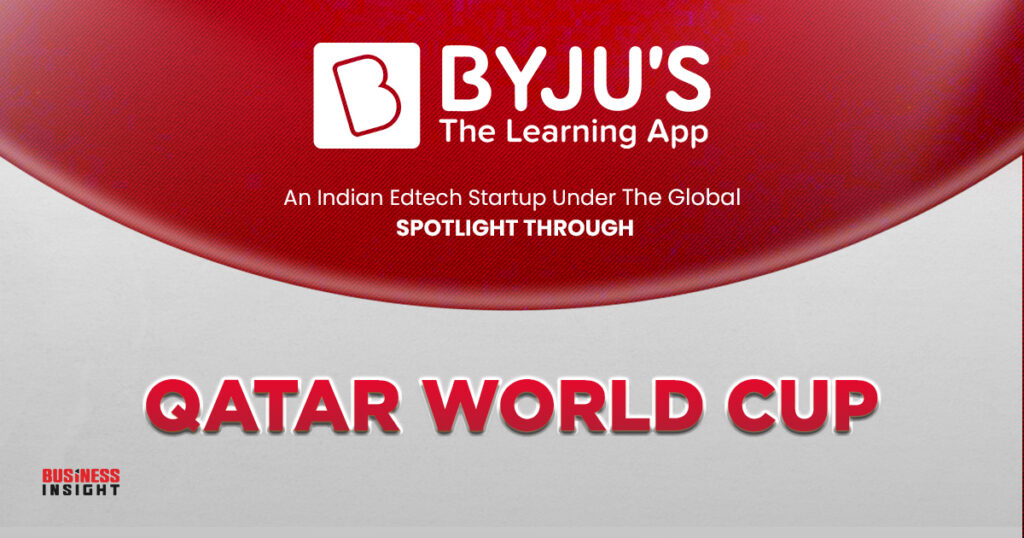Introduction
The FIFA world cup is referred to as the biggest show on earth. Showcasing your brand on such a big platform is undoubtedly a grand move for your business. Though there are several international unicorns to grab the spot, this time it’s an Indian startup that got there. Talking about Byju’s— an Indian multinational educational technology company. Byju’s was the official sponsor of FIFA World Cup 2022 held in Qatar and got under the global spotlight.
This article will reveal the business model of Byju’s as well as its marketing strategy with detailing the world cup sponsorship deal.
Company Overview
Headquartered in Bangalore, Karnataka, India, BYJU’S is an innovative global edtech leader at the intersection of content, media and technology. Mr. Byju Raveendran and his wife Mrs. Divya Gokulnath co-founded the platform in 2011. According to the Forbes list of India’s 100 Richest People, Byju Raveendran is the country’s youngest billionaire with a net worth of $3.05 billion (as of 2020). Byju’s now has a global presence in more than 120 countries. Within ten years of its founding, the firm has grown to serve a sizable student population all over the world, offering a variety of services from Osmo, Tynker, Epic, Great Learning, Aakash, and Toppr. These services range from K-12 and competitive test preparation to early learning and coding to professional upskilling courses. As of July 2022, the company is valued at 23 billion USD. As their official website claims, more than 150 million students trust and rely on the platform.
The app was initially developed by Think and Learn Pvt Ltd, and achieved enormous popularity in 2011. The firm launched Byju’s: The Learning App in August 2015. More than 15 million students use the app worldwide while the paid subscription base is about 9,00,000 people.
Business Model of Byju’s
Byju’s operates using a freemium business model, with free access to material only available for 15 days following registration. The first and foremost strength of Byju’s is that it belongs to the ed-tech industry or the e-learning market. The global e-learning market is expected to cross 300 billion USD by 2025. The sector is quite potential with expanding over the past few years. If the Covid-19 pandemic had blessed a few sectors, then e-learning is definitely one of them.
With technologies that lie at the intersection of mobile, interactive content, and individualized learning approaches, BYJU’S offers a top-notch learning experience. Learning is made entertaining by BYJU’s geography-independent solutions and 12,000+ teachers through visual and contextual programs that adjust to each student’s particular learning style, ability level, and speed. Additionally, BYJU’S has creative collaborations with some of the most well-known businesses in the world, including Disney and Google, to boost engagement and support even more students in becoming active, lifelong learners.
The Chan-Zuckerberg Initiative, Sequoia Capital, Bond Capital, Silver Lake, BlackRock, Sands Capital Management, Alkeon Capital Management, Sofina, Verlinvest, Tencent, Prosus (formerly Naspers Ventures), CPPIB, General Atlantic, Tiger Global, Qatar Investment Authority, Owl Ventures, Lightspeed Venture Partners, Times Internet, Aarin Capital, and IFC are just a few of the prestigious investors who support BYJU’S. Since 2017, BYJU’S has acquired more than 15 businesses, including ones in the United States, the United Kingdom, Austria, India, and Singapore.
Byju’s: Mission and Vision
BYJU’s is on a mission to change the learning system with relentless innovation and hard work, to break barriers to quality education and to establish a learning environment that will produce tomorrow’s leaders. Byju’s was named in the Time 100 Most Influential Company list in 2021. Globally, it has operations in more than 21 different countries and provides educational materials in over 8 different languages.
Driven by its goal of maximizing human potential, BYJU’S has already given digital learning opportunities to 3.4 million children from underprivileged communities in India. By 2025, it hopes to have reached 10 million students in its own country. In FY22, Byju’s expects revenue of Rs 10,000 crore.
Byju’s In FIFA World Cup Qatar 2022
Byju’s became the official sponsor of the FIFA World Cup, held in Qatar during November-December. With this collaboration, BYJU’S will interact with ardent soccer supporters all around the world by utilizing its rights to the FIFA World Cup 2022 marks, symbol, and assets and running special campaigns. As part of a comprehensive activation strategy, it will also provide entertaining and innovative material with instructive themes. However, this was not the first time Byju’s got into sports for sponsorship purposes. It earned the sponsorship contract for the Indian cricket team’s jersey in July 2019.
The sponsorship deal in Qatar world cup is worth $30-40 million which is expensive yet affordable for Byju’s. However, it is worth it, exposing the brand to over half of the global population. In May this year, FIFA president Gianni Infantino projected the show to be watched by 5 billion people around the globe, as per Reuters. Los Angeles Times reported that the final match of the tournament between France and Argentina drew an average of about 26 million viewers globally.
Being under the limelight, Byju’s will become more well-known in developed countries like the US, UK, and Australia as well as in emerging markets like Mexico and Brazil. Localized ads will be less necessary due to visual TV advertising and World Cup-related social media promotions during the world cup. Byju’s, which is currently supported by organizations like the Chan-Zuckerberg Initiative, BlackRock, and Tiger Global, may also attract the attention of more international investors.
Conclusion
Despite all strengths and potentials, Byju’s has its own challenges too. Turning the incoming audience into subscribed users is the core challenge of the company. National Commission for Protection of Child Rights (NCPCR) has recently claimed the company is allegedly purchasing the phone numbers of children and their parents, as per Hindustan Times.
However, Byju’s has represented the entire Asian start-up potential globally. The farm is on a roller-coaster ride of rising growth. Other Asian start-ups should take lessons and inspiration from its journey and appear stronger to compete in the global market.



